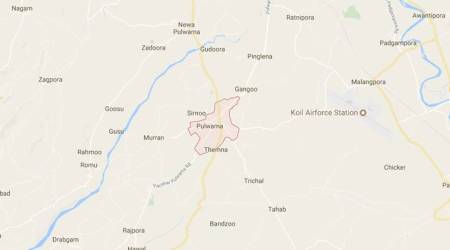 FILE – In this Monday, July 24, 2017 file photo, Men look at the remains of their properties at the site of a suicide attack in Kabul, Afghanistan. In the last week the Taliban have overrun two districts in the north and west of Kabul, temporarily cut a key highway linking the capital to the north and staged a suicide bombing in the heart of the capital Kabul. (AP Photos/Massoud Hossaini, File)
FILE – In this Monday, July 24, 2017 file photo, Men look at the remains of their properties at the site of a suicide attack in Kabul, Afghanistan. In the last week the Taliban have overrun two districts in the north and west of Kabul, temporarily cut a key highway linking the capital to the north and staged a suicide bombing in the heart of the capital Kabul. (AP Photos/Massoud Hossaini, File)
Seeking enhanced corporation with India in Afghanistan, a bipartisan group of American senators have introduced a legislative amendment to the National Defence Authorisation Act (NDAA) – 2018 in the US Senate. The amendment will also increase the role of New Delhi in helping the Afghan security forces, PTI reports. India is one of the biggest providers of developmental assistance to Kabul. If passed by the Senate and implemented by the US and India, the amendment will increasing India’s role in assisting the Afghan security forces through logistics, threat analysis, intelligence, material, and maintenance support.
“Improve the provision by India of humanitarian and disaster relief assistance to Afghanistan, including through the provision of logistics support by India, joint training between Afghanistan and India, and combined military planning by Afghanistan and India for humanitarian assistance and disaster relief missions in Afghanistan,” the amendment says.
The amendment was moved on Thursday by senators Dan Sullivan, Gary Peters, John Cornyn and Mark Warner. Warner is the vice chair of the powerful Senate Select Committee on Intelligence, while Cornyn is the Senate Majority Whip for the Republican Party. Warner and Cornyn are also the co-chairs of the Senate India Caucus.
The amendment asks Defence Secretary Jim Mattis and Secretary of State Rex Tillerson to identify ways in which India can take “security and development related steps” in Afghanistan. It has urged the Pentagon and the State Department to find ways in which India can support “targeted infrastructure development” and economic investment in Afghanistan.
Calling for a tri-lateral security and civilian co-operation between India, Afghanistan and the US, it seeks establishment of priorities for investments to promote security and stability in Afghanistan that align with the “mutual interests” of Afghanistan, India, and the US. It also calls for identifying gaps in the capabilities of Afghanistan security forces, determining means of addressing such gaps as well as identifying economic and infrastructure development opportunities related to improving security and stability in the country. The Senate is yet to vote on the NDAA-2018.
Earlier this week, a retired US Air Force officer and defence expert Lt Gen (Retired) McInerney was asked by Fox News why the US has been achieving success in Syria and Iraq but not in Afghanistan. To this, McInerney had replied, “One word, Pakistan. Pakistan for the last almost 16 years, has been supporting the Taliban. When they (Pakistan) said, when (President) George Bush said, ‘you are either with us or against us, they (Pakistan) said they are with us … Well, they have not been with us and we have to acknowledge that…
“There are nine major cities in Balochistan that are raising money, supporting them (the terrorists) and recruiting, as well as their training areas. We have a major problem, because in the non-fighting season, in the winter time, they (terrorists) retreat back into into Pakistan.”
When asked why Washington continues to support Islamabad, McInerney cited two reasons: “The first being that Pak does not want a strong Kabul, where say India or others start working with them (Afghanistan) and outflank the Pakistanis. They are definitely afraid of that, and second, there is the Pakistan-China economic corridor that moves into the Middle East through Afghanistan.”
(Inputs from agencies)

